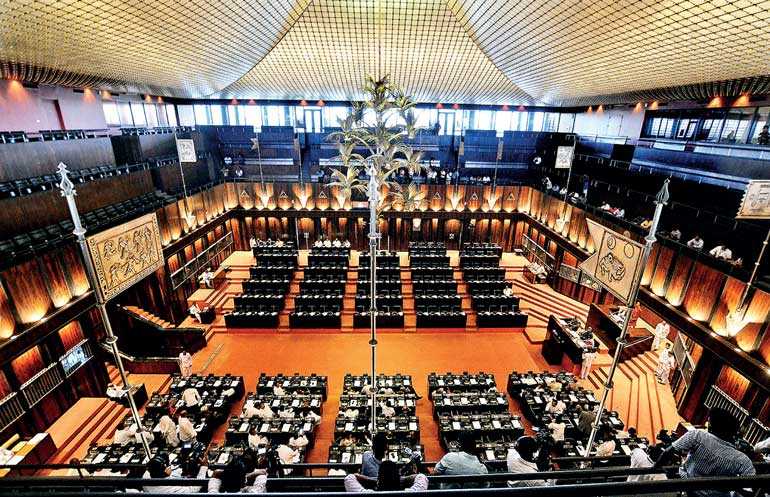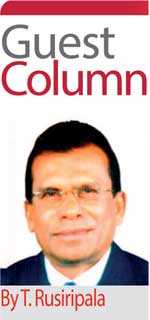Thursday Feb 26, 2026
Thursday Feb 26, 2026
Wednesday, 18 March 2020 00:00 - - {{hitsCtrl.values.hits}}

Voters have to think soberly. Is it a power bloc in a Parliament with absolute power that the country needs or is it a set of right-thinking MPs? The clamour for the two-thirds appears to be a persuasion or dissuasion intended to drift the mindset away from the realities – Pic by Shehan Gunasekara
The pursuit of a two-thirds parliamentary majority appears to be a manoeuvred notion adopted by leading main political parties to drive the gullible voters. But they themselves are either highly disintegrated due to splits among the leadership or in quasi alliances serving as ornamental facades ostensibly designed as window dressing to the existing differences among the constituents.
In such a context it is timely to examine the reality behind the two-thirds majority morass entrapping several falsehoods. Let us take a quick look at the definitions of democracy, despite their age, running back to periods beyond 18th century. 
Democracy
One famous definition, often quoted, goes as follows: “A government of all the people, by all the people and for all the people.” Despite the greatness of the involved hypothesis, the ideal incorporated in this definition remains a distant dream with the passage of time, and we hear even today, mumblings of discontent from all over.
Trust in governments is disappearing and hopes evaporating. We have seen the rise, operation and fall of many powerful regimes most of which had been run by closed circles overly influenced by factors of a selfish nature. What we have witnessed so far are adaptations by governments with a more serious focus to stay in power than to embrace new opportunities and visions.
It looks like the governments know what they should do, but they are more concerned about how they could get re-elected after doing those. Most political parties today are slogging behind the expectations of a new generation clamouring for a rapid change well acquainted with ideas of what those changes should be. Therefore, the directions of change are often advocated not from within the parliamentary powers but from sources outside. All governments that come to power after defeating a regime of super majority power clamour to undo bad things done misusing that power by the predecessor.
Absolute power
Why are political parties aspiring to come to power demanding absolute power? Let us examine the historical facts associated with powerful governments, some so elected and others accomplished that status through manipulations.
In the election held on 27 May 1970 to elect 151 members to the House of Representatives of Ceylon, the SLFP led by Sirimavo Bandaranaike secured 91 seats while the LSSP and the CP won 19 and six each respectively. The main opposition UNP got only 17 seats. The ruling party composed of a coalition, the United Front, enjoyed an absolute majority. This Government replaced the British Imposed Sol bury Constitution with a Republican Constitution. 
With the adoption of the new Constitution on 22 May 1972 the Parliament which was hitherto known as the House of Representatives became the first National State Assembly and a new Cabinet was sworn in. Under this NSA a resolution was passed to extend the life of the Parliament by two years and it was dissolved on 18 May 1977. This Government had to leave unceremoniously in the next election. I quote here a statement made by late Felix Dias Bandaranaike in the immediate aftermath of this defeat: “Have we given heed and listened to the people’s voice, their feelings, and frustrations or have we unilaterally pushed a program which we thought was good for the people materially. Is that all a human being wants, a young man a young university student wants? …the value system of the new generation has to be understood and not overlooked… their anxieties with regard to their aged parents in a distant home far away has to be understood…”
Draconian system
In the General Election that was held on 21 July 1977 late J.R. Jayewardene became the Prime Minister and he secured an overwhelming majority for the UNP as a single party with a five-sixths of the number of seats in Parliament which was a historic victory never bypassed.
In 1978 with these Parliamentary powers the UNP introduced a new Constitution repealing the Republican Constitution passed in 1972. A presidential system of rule was introduced with the creation of a monstrous Executive. Immediately after the 1978 Constitution undated resignation letters were obtained from all MPs addressed to the President as a measure to prevent any crossovers or defections.
This constitution underwent 16 amendments under the same UNP, the last of which was passed on 17 December 1988.
The draconian system associated with the absolute majority rule saw the birth of several events the hidden purposes of which were self-evident. The very first amendment was brought to change Article 140 of the Constitution; by providing, “…Parliament may by law provide that in any such category as cases that may be specified in such law, the jurisdiction conferred on the Court of Appeal by the preceding provisions of this article shall be exercised by the Supreme Court and not by the Court of Appeal.”
Then existing Article 140 read as, “the Court of Appeal shall have full power and authority to inspect and examine the records of any court of first instance, or tribunal or other institution, and grant and issue, according to law, orders in the nature of writs of certioreri, prohibition, procedendo, mandamus and quo warranto against the judge of any court of the first instance, or tribunal or other institution or any other person.”
It is interesting to recall that all these happened when the Government attempted to strip Sirimavo Bandaranaike, the former Prime Minister, of her civic rights. Her lawyers first succeeded acting under the existing law; but after the legislative changes quoted above, the decision of the judges of the Court of Appeal were reversed and after subsequent judicial interpretation, Sirimavo Bandaranaike was deprived of her civic rights and consequently her political party was pushed into a disarray.
Then came the next amendment to the Constitution, which empowered the Secretary of a political party to expel a MP when he ceases to be a member of that party.
The third amendment was to allow the President to declare his intention to stand for election for a further term any time after completion of four years in his term of office. Immediately after the first Presidential Election which re-elected J.R. Jayewardene for a second term of office, it was decided to hold a referendum as shown in the image.
This was essentially to extend the life of the Parliament without holding a General Election, for another full term. The five-sixths majority in Parliament was the governing factor. It is now history as to how the referendum was held, who supported and who opposed it.
The referendum was preceded by a campaign of political victimisation of activists who held opposing views to all that was going on. Many were sent to jail, and I too had the blessing of serving a short period in the Mahara Prisons as a remand prisoner.
18th and 19th Amendments
In the elections held thereafter parties did not emerge with such huge parliamentary majorities. However in the 2010 General Election which was held soon after the defeat of LTTE terrorist movement, the euphoria surrounding the victory helped the Rajapaksa Government easily slip into another term with a resounding majority.
However, the numbers were a little short of the two-third power factor. But the unlimited accommodation that was possible in an ever-expanding Cabinet, and frustration of elements in the UNP under its uncompromising leadership paved the way for some crossovers to give sufficient numbers to the Rajapaksa Government to have the required majority to give effect to another set of amendments to the constitution. As a result, the much-disputed 18th Amendment emerged providing unlimited terms of office for a President. This amendment was passed in the Parliament on 8 September 2010, with 161 MPs voting for and 17 against.
It is interesting to note that this amendment followed election time promises to abolish the executive presidency. The popularity of President Rajapaksa had reached a zenith after ending the Eelam war and the main Opposition party was in complete disarray and was going through a crisis. The amendments were brought in as a ‘national urgency’. The 18th Amendment gave the President full control over the Executive and Legislature as well as the Judiciary.
It is an irony of history that the MPs of the same Parliament voted against their earlier decision to repeal it and to be replaced with the 19th Amendment on 15 May 2015.Their voting on 28 April 2015 was as follows; 215 voting in favour, one against, one abstention and seven absent. Another important thing to remember here is that this Parliament did not have either the two-third or the five-sixth majorities. But the same MPs under some influence or divine guidance have had the second thoughts of repealing what they voted for during the life span of the same Parliament.
Voters have to think soberly
Voters have to think soberly. Is it a power bloc in a Parliament with absolute power that the country needs or is it a set of right-thinking MPs? The clamour for the two-thirds appears to be a persuasion or dissuasion intended to drift the mindset away from the realities. People have to do as they please taking into account and carefully considering the comical, capricious and despicable roles played throughout the history by those who again seek our support to lead our country’s future.
The world is committed to end autocratic systems and ensure fundamental human rights and a free living. Such rights will be guaranteed by rules that uphold democratic values. In a way when we grant absolute powers we are giving beyond the need to represent us. We need not create elected dictatorships. Today parliamentarians are more under pressures to adhere to party disciplines than their own conscientious thinking. Instead of adversarial confrontations as we witness often in the Parliament, compromise will be the best way forward. The voters’ wish is to ensure a visionary approach to our problems by the elected representatives.
We all yearn for a better human life as a right and not for something that come our way at someone’s benevolence. Laws rules and values should be initiated from our own value systems and not as top down dictates. We need to build a society with values and the growth to be meaningfully directed towards a greater purpose rather than an end in itself.
If we cannot achieve this in one shot, let us try to at least catalyse the process. A catalyst can speed up a reaction, but is not consumed by the reaction. It will emerge unchanged after imparting the desired effect.
In Parliament certain groups that professed and promised independent roles unfortunately have ended up as hidden appendages of the same rotten system. Let us all get together to gradually put an end to this sordid state of affairs within our rights.
“The greater the power, the more dangerous the abuse.”
“Power tends to corrupt, and absolute power corrupts absolutely.”